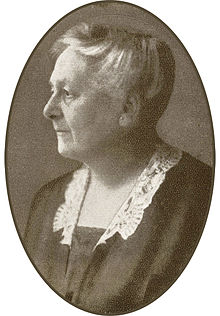Henriette May

Henriette May , b. Lövinson (born March 25, 1862 in Berlin ; † May 14, 1928 there ) was a German women's rights activist and teacher of Jewish origin. She made a contribution to social work .
Life
She was born into a large, religious and humanitarian family. In her hometown she attended the Royal Augusta School and then the teacher training college . Then she worked as a private tutor and educator in Berlin and London.
In 1890 Henriette Lövinson married the authorized signatory Max May, who later became director of a malt factory. Since the marriage remained childless, the 30-year-old, like so many other middle-class women, looked for meaningful employment outside the home. She became a member of the Society for Ethical Culture . Henriette May worked closely with Jeanette Schwerin and became an employee of Alfred Levy . With the latter, she published the first publication on the existing welfare institutions in Greater Berlin.
Again and again she called on the German Jewish women to be politically active and to cooperate. Accordingly, the organization of Jewish women seemed essential to her. Alongside Bertha Pappenheim , who as an active feminist personified the social conscience of German Jews to a certain extent , and Sidonie Werner , she was one of the co-founders of the Jewish Women's Association (JFB), which was established in 1904. She remained the organization's secretary until her death. Henritte May founded the Israelite Teachers ' Home Association in Berlin , which joined the JFB, and an old people's home for Jewish women. She was a board member and board member in both institutions.
- As a former teacher, she was particularly concerned about the high unemployment among Jewish teachers in the period before the First World War. She urged the JFB and the German women's movement to combat the prejudices that caused this problem .
In addition to Bertha Pappenheim, Siddy Wronsky u. a. In 1917 she was one of the founders of the Central Welfare Office of German Jews . There she held the office of treasurer. Henriette May was involved in many other clubs and organizations. She was u. a. Member of the Wilmersdorfer Welfare Commission , in the voluntary educational advisory board for school-leavers , in the home care association , the central office for private welfare of the interdenominational station mission , in the society for the promotion of craft and agriculture among the Jews , in the German national committee to combat trafficking in girls and in the Central Association German citizen of the Jewish faith , where she took care of the education and professional training of Ukrainian pogrom children.
Henriette May found her final resting place in the Jewish cemetery in Berlin-Weissensee.
Fonts
- The welfare institutions of Greater Berlin , Berlin o. J.
literature
- Henriette May in memory. Dedicated by her family in association with the Central Welfare Office for German Jews and the Jewish Women's Association . Central Welfare Agency, undated undated [Berlin, 1929]
- Jutta Dick (ed.): Jewish women in the 19th and 20th centuries. Reinbek 1993, pp. 265-266
- Marion Kaplan: The Jewish Women's Movement in Germany. Hamburg 1981, p. 143 f
- Sabine Hering (ed.): Jewish welfare in the mirror of biographies. Frankfurt 2006, pp. 284-294.
- Nanette Wolf: May, Henriette , in: Hugo Maier (Ed.): Who is who of social work . Freiburg: Lambertus, 1998 ISBN 3-7841-1036-3 , p. 383f.
- Verena Mayr: Jewish women's movement and Jewish welfare - Henriette May for example. Munich 1999 (unpublished diploma thesis)
- Siddy Wronsky: Henriette May. In: Zedakah. Journal for Jewish Welfare Care. 1928, H. 3-4, pp. 55-63
Web links
Individual evidence
- ↑ Kaplan 1981, p. 143 f
| personal data | |
|---|---|
| SURNAME | May, Henriette |
| ALTERNATIVE NAMES | Lövinson, Henriette (maiden name) |
| BRIEF DESCRIPTION | German women's rights activist, teacher and social worker |
| DATE OF BIRTH | March 25, 1862 |
| PLACE OF BIRTH | Berlin |
| DATE OF DEATH | May 14, 1928 |
| Place of death | Berlin |